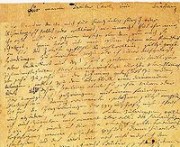Baudolino?
Baudolino?
No
« I met a traveller from an antique land
Who said: Two vast and trunkless legs of stone
Stand in the desert. Near them on the sand,
Half sunk, a shatter'd visage lies, whose frown
And wrinkled lip and sneer of cold command
Tell that its sculptor well those passions read
Which yet survive, stamp'd on these lifeless things,
The hand that mock'd them and the heart that fed.
And on the pedestal these words appear:
"My name is Ozymandias, king of kings:
Look on my works, ye Mighty, and despair!"
Nothing beside remains. Round the decay
Of that colossal wreck, boundless and bare,
The lone and level sands stretch far away. »

Il libro è ambientato almeno parzialmente in Piemonte (la parte "italiana", intendo)?
Il libro è ambientato almeno parzialmente in Piemonte (la parte "italiana", intendo)?
No
« I met a traveller from an antique land
Who said: Two vast and trunkless legs of stone
Stand in the desert. Near them on the sand,
Half sunk, a shatter'd visage lies, whose frown
And wrinkled lip and sneer of cold command
Tell that its sculptor well those passions read
Which yet survive, stamp'd on these lifeless things,
The hand that mock'd them and the heart that fed.
And on the pedestal these words appear:
"My name is Ozymandias, king of kings:
Look on my works, ye Mighty, and despair!"
Nothing beside remains. Round the decay
Of that colossal wreck, boundless and bare,
The lone and level sands stretch far away. »
Il libro è ambientato tre Ducato di Milano e Repubblica di Venezia?
Il libro è ambientato tre Ducato di Milano e Repubblica di Venezia?
In senso letterale? O nel senso di "in uno di questi due posti"? Se l'interpretazione corretta è la seconda, la risposta è Sì. Se è la prima la risposta è No.
« I met a traveller from an antique land
Who said: Two vast and trunkless legs of stone
Stand in the desert. Near them on the sand,
Half sunk, a shatter'd visage lies, whose frown
And wrinkled lip and sneer of cold command
Tell that its sculptor well those passions read
Which yet survive, stamp'd on these lifeless things,
The hand that mock'd them and the heart that fed.
And on the pedestal these words appear:
"My name is Ozymandias, king of kings:
Look on my works, ye Mighty, and despair!"
Nothing beside remains. Round the decay
Of that colossal wreck, boundless and bare,
The lone and level sands stretch far away. »
L'autore è di lingua inglese?

Jacopo Ortis?
Iago dell'Otello
Iago dell'Otello
Esatto!  ">
">
Il personaggio della prima foto è San Giacomo, visto che Iago è una variante del nome Giacomo. Il fazzoletto della seconda foto invece è un indizio interno all'opera e si riferisce all'inganno del fazzoletto perpetrato da Iago ad Otello e Desdemona.  ">
">
Edit: mi sono appena accorto di aver fatto un errore sull'ultima domanda di Eddard. E' del tutto evidente infatti che Shakespeare è nato e morto prima del XX secolo. Chiedo venia. 
« I met a traveller from an antique land
Who said: Two vast and trunkless legs of stone
Stand in the desert. Near them on the sand,
Half sunk, a shatter'd visage lies, whose frown
And wrinkled lip and sneer of cold command
Tell that its sculptor well those passions read
Which yet survive, stamp'd on these lifeless things,
The hand that mock'd them and the heart that fed.
And on the pedestal these words appear:
"My name is Ozymandias, king of kings:
Look on my works, ye Mighty, and despair!"
Nothing beside remains. Round the decay
Of that colossal wreck, boundless and bare,
The lone and level sands stretch far away. »
beh, beh...
"personaggio di un libro?" "sì"
insomma... non è che l'Otello di Shakespeare sia proprio un libro.
cioè, la tragedia in questione sarà ben stata scritta su dei fogli rilegati e racchiusi da una copertina (libro)... ma a questo punto anche la sceneggiatura di pulp fiction tecnicamente è un libro, e non so quanto sia corretto dire che "mia wallace è il personaggio di un libro"...
Evvai!!
Finalmente ne indovina uno!
Allora, vediamo un po':
- Uomo
- "Titiro, tu riposando alla cupola vasta di un faggio,
mediti un canto silvestre sulla sampogna leggera;
noi lasciamo i confini, lasciamo le dolci campagne,
noi fuggiamo la patria"
- 
Sperando non sia troppo facile...
E' Virgilio?...peraltro non riesco a capire bene qual'è l'immagine del terzo indizio...un foglio manoscritto del XVI secolo, per caso?
E' Virgilio?...peraltro non riesco a capire bene qual'è l'immagine del terzo indizio...un foglio manoscritto del XVI secolo, per caso?
No a entrambe.
Beh dai, Virgilio sarebbe stato veramente trooooooooooppo facile.
 " />
" />
beh, beh...
"personaggio di un libro?" "sì"
insomma... non è che l'Otello di Shakespeare sia proprio un libro.
cioè, la tragedia in questione sarà ben stata scritta su dei fogli rilegati e racchiusi da una copertina (libro)... ma a questo punto anche la sceneggiatura di pulp fiction tecnicamente è un libro, e non so quanto sia corretto dire che "mia wallace è il personaggio di un libro"...
Non capisco l'obiezione. L'Otello viene pubblicato, la sceneggiatura di un film (il più delle volte) no.
Evvai!!
Finalmente ne indovina uno!
Allora, vediamo un po':
- Uomo
- "Titiro, tu riposando alla cupola vasta di un faggio,
mediti un canto silvestre sulla sampogna leggera;
noi lasciamo i confini, lasciamo le dolci campagne,
noi fuggiamo la patria"
-
Sperando non sia troppo facile...
Personaggio reale?
« I met a traveller from an antique land
Who said: Two vast and trunkless legs of stone
Stand in the desert. Near them on the sand,
Half sunk, a shatter'd visage lies, whose frown
And wrinkled lip and sneer of cold command
Tell that its sculptor well those passions read
Which yet survive, stamp'd on these lifeless things,
The hand that mock'd them and the heart that fed.
And on the pedestal these words appear:
"My name is Ozymandias, king of kings:
Look on my works, ye Mighty, and despair!"
Nothing beside remains. Round the decay
Of that colossal wreck, boundless and bare,
The lone and level sands stretch far away. »